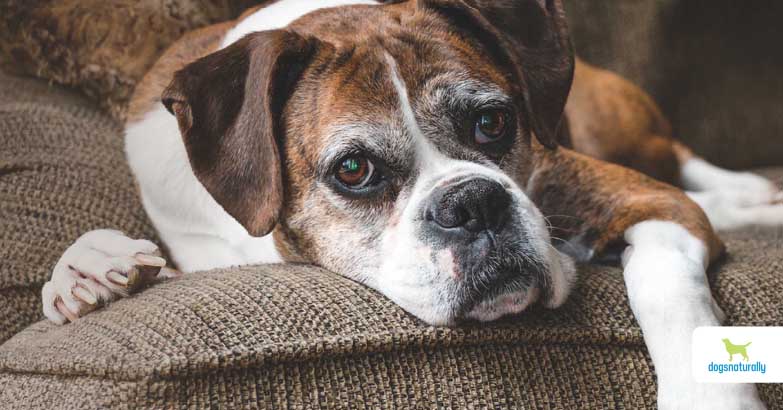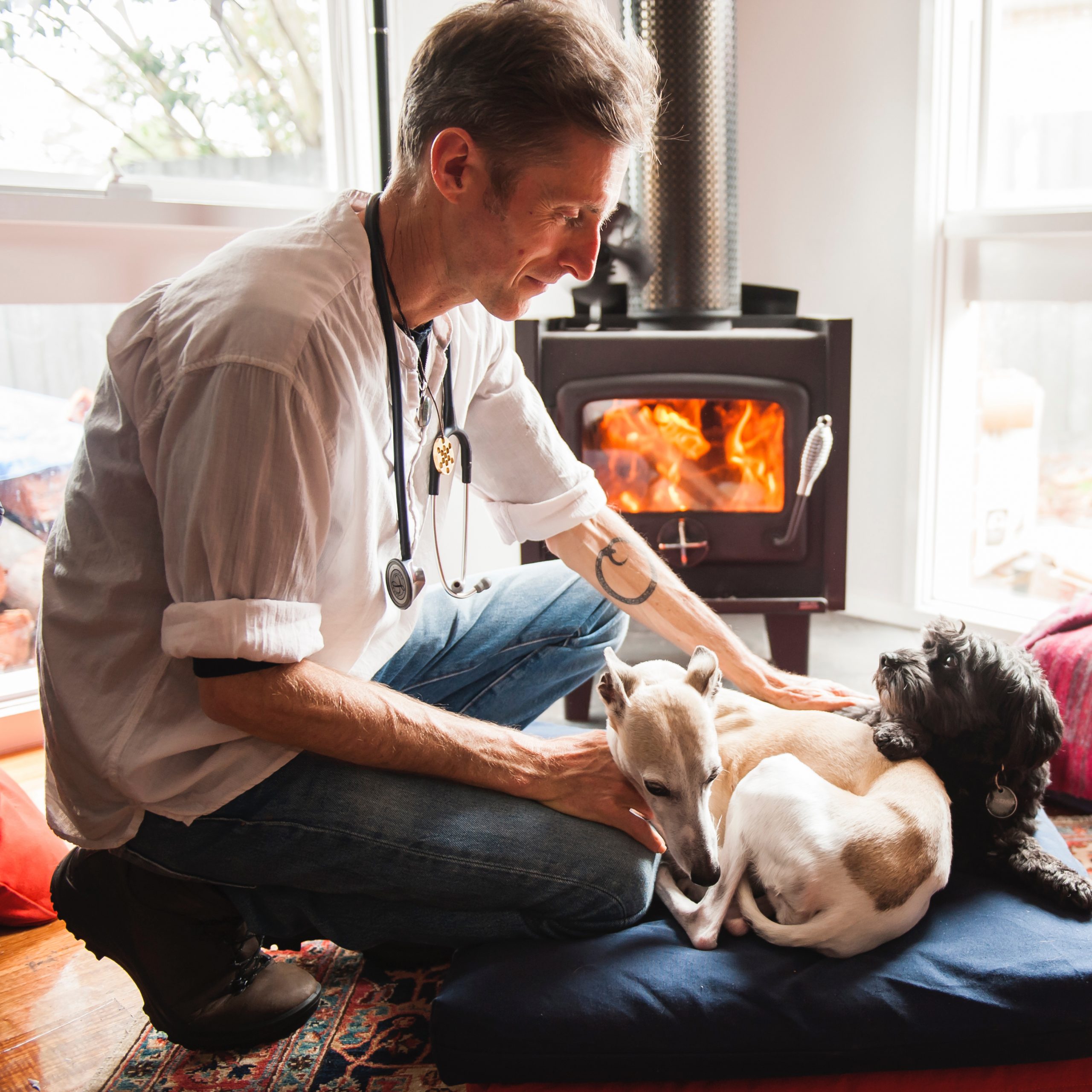Just like you, your dog’s brain ages and wears out … the same as the rest of his body.
But in some dogs, the brain wears out quicker than in others. This causes a spectrum of symptoms that we call Canine Cognitive Dysfunction (CCD), or simply, dog dementia.
The degenerative changes in the brain tissue that cause dementia in dogs aren’t well understood. We do know that the number of nerve cells reduces as dogs age. A build-up of neurotoxic deposits in the brain may be a contributing factor. High levels of free radicals also appear to lead to decline in cognitive function.
So, how common is dog dementia … and how do you know if your dog has it?
How Common Is Dog Dementia?
Canine cognitive dysfunction is more common than most dog owners realize! In one study, about 50% of dogs over 11 years of age displayed at least one sign of CCD. Another study showed that 68% of dogs between 15 and 16 years of age may show at least one sign of CCD.
Another important thing to note is that CCD is a progressive disease. More than half of the dogs with at least one clinical sign will develop more symptoms within 12 months.
The older your dog, the more likely he is to develop CCD. That said, giant breeds age more quickly and may develop CCD as early as 5 to 7 years old. Also, it seems that neutered dogs have a slightly higher risk.
Dog Dementia Symptoms
Dementia in dogs can be easy to miss, for a couple of reasons:
- Dementia is very slow to develop. The symptoms come on so slowly that they just seem to be part of the normal.
- There’s a myth that it’s normal for old dogs to get a bit strange. Many people write it off as a ‘normal’ part of the aging process (it isn’t).
So how can you tell if your dog has dementia? We’ll use the acronym “DISHA” to look at the common symptoms of dementia in dogs.
Disorientation
This can include staring into space or getting lost in familiar surroundings. Your dog may not be able to find his way in and out of the house, or he may get stuck in corners or under tables. Your old friend may seem confused all the time. Some dogs will forget you’ve fed them. You may also see anxiety develop, with a range of triggers. He may start barking at nothing. Continual pacing is another common symptom.
Changes In Interactions
Your old dog’s ability to maintain healthy relationships may decline. He may either show decreased affection or become overly attached and stick to a particular person like glue. Some will become irritable and grumpy.
Sleep-Wake Cycle Changes
This is where sundowner syndrome can kick in or sleep patterns will become affected. Your old friend may start to become unsettled in the evenings or all through the night. Some dogs with dementia won’t sleep at all and others will wake often, be restless, etc. They will often bark in the night for no clear reason. And sometimes they’ll sleep all day and be up all night, wanting your attention.
No Longer Housetrained
Your dog may forget all his housetraining and start messing in the house. This can also happen because he can’t find his way outside at all, or in time. You may also see a lack of response to commands and an inability to perform tasks that he once could do with ease.
Reduced Activity Levels
Your old friend may not want to do anything much at all (sometimes not even eat). On the flipside, you’re likely to see restless behavior with continual pacing or aimless wandering around. Some dogs will develop obsessive-compulsive behaviors like licking floors.
How To Prevent Dementia In Dogs
Yes, dementia in dogs is a progressive, degenerative disease. It gets worse over time. But if you act early, there’s plenty you can do to slow it down, and often reduce or sometimes even clear the symptoms altogether.
Keep an eagle eye out for any symptoms. If you see any subtle signs, it’s time to kick into overdrive and take action. I can’t stress enough that the prognosis is good if your dog’s dementia gets diagnosed early, and poorer if diagnosed late.
The sooner you act, the better the results will be.
Diet For Dogs With Dementia
To help delay the onset of dementia in dogs or prevent it altogether, you should feed a healthy, complete, whole food diet. Raw is usually best, but some older dogs do better on a home cooked diet if their digestive fires are burning low.
RELATED: Here’s how to switch your older dog to raw diet …
Supplements For Dog Dementia Natural Treatment
You’ll also want to consider adding some (or all) of the following supplements:
- High-quality omegas-3s. (EPA and DHA play an important role in brain health).
- Give plenty of vital antioxidants (these help lower toxic free radical levels in the body). One great antioxidant supplement is blueberries. Another is green tea steeped in cold water for 12 hours.
- CBD for dog dementia is the best medicine I’ve ever seen for dogs with cognitive decline. After just 3 days on CBD oil, one dog who’d kept his mum awake every night for a year started sleeping through the night. I have consistently seen obvious reductions in symptoms with the use of CBD oil.
- PEA (Palmitoylethanolamide) is another non-toxic, natural and highly effective medicine. You can buy it at health stores and use it alone or alongside CBD oil.
- I have found that many dogs with dementia have significant undiagnosed pain (usually from arthritis or back pain). When treated with appropriate pain relief, the symptoms often improve significantly. Natural medicines such as turmeric (golden paste) and green-lipped mussels can make a big difference.
Other supplements that can help include:
- SAMe (S-Adenosylmethionine)
- Ginkgo biloba
- Melatonin
- Vitamins C, and E
- B Vitamins
- Gotu kola
- Resveratrol
- Valerian root
DNM RECOMMENDS: Four Leaf Rover offers organic Lion’s Mane mushrooms. Lion’s Mane is proven to help with cognitive dysfunction, depression and spine problems. Buy Lion’s Mane now >>
Other Dog Dementia Treatment
Hands-on bodywork can be a huge help with increasing quality of life. It can reduce anxiety and pain while increasing connection. Acupuncture or acupressure plusTraditional Chinese herbs can be a great support for dogs with dementia.
When caring for a dog with dementia, there are also a host of proprietary remedies out there. I encourage you to seek a holistic vet or a skilled animal naturopath. They can help make sure that you give your old friend the best treatments for his needs.
And last, but definitely not least, is enrichment and gentle exercise and affection. Do things with your old dog: simple games, gentle training sessions, intentional touch and regular light exercise. This will help give him mental stimulation.
Please note: If your old dog is nearing the end, palliative use of any and all prescription pain relief medications that help may be necessary.
Be sure to keep the house uncluttered and all the furniture in the same place. And enjoy every moment, with heaps of love, tons of cuddles and a heart full of compassion!
References
Neilson JC, Hart BL, Cliff KD, Ruehl WW. Prevalence of behavioral changes associated with age-related cognitive impairment in dogs. Journal of the American Veterinary Medical Association. 2001;218(11):1787-91.
Osella MC, Re G, Odore R, Girardi C, Badino P, Barbero R, Bergamasco L. Canine cognitive dysfunction syndrome: Prevalence, clinical signs and treatment with a neuroprotective nutraceutical. Journal of Applied Animal Medicine. 2007.












